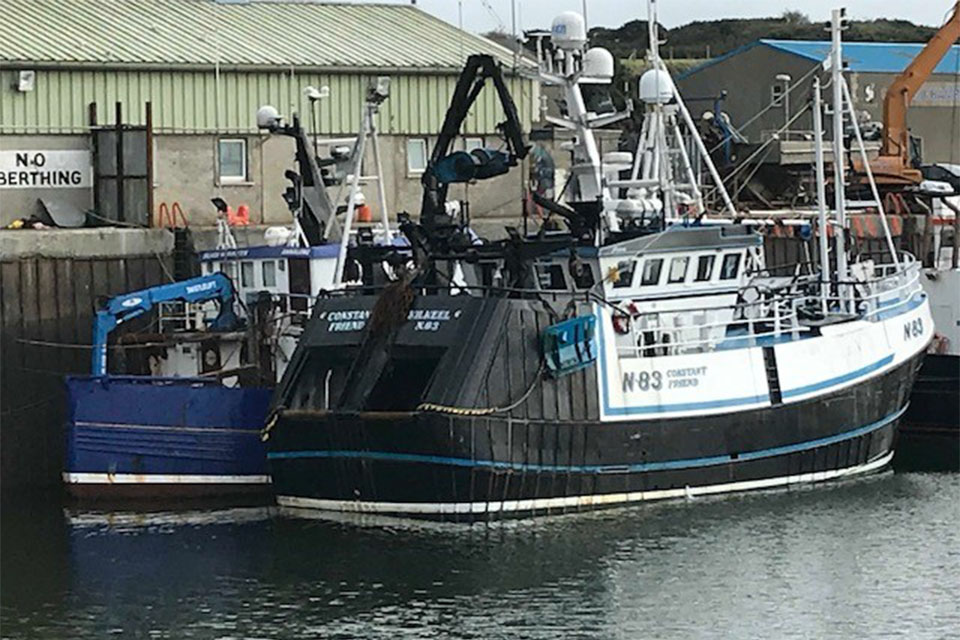Safety flyer to the fishing industry - Constant Friend
Published 22 March 2018
1. Summary
Fishing boat Constant Friend (N83) fatal man overboard while boarding on 23 September 2017

Constant Friend alongside another fishing vessel
2. Narrative
At approximately 2342, on 23 September 2017 a Filipino crewman from the fishing boat Constant Friend fell into the water at Kilkeel Harbour while attempting to board the boat.
The crewman had been socialising ashore with other members of the crew and had stayed drinking alcohol when his colleagues returned to the boat. Constant Friend was berthed outboard of another fishing boat adjacent to the fish market buildings in the harbour. Access to the boat was by climbing over guardrails onto the deck of the first boat and then repeating this procedure to access Constant Friend. The fisherman was recovered from the water by his crewmates, who commenced CPR. Resuscitation efforts were suspended while he was carried to the Fishermen’s Mission where RNLI lifeboat crew and coastguard rescue team (CRT) members arrived and resumed CPR until an ambulance arrived. The crewman was transferred to hospital but died in intensive care on 28 September.
The MAIB investigation identified that climbing over the guardrails to cross between the two vessels was inherently hazardous. The risk of a slip or fall was further increased because it was dark, the surfaces were wet, and the vessels were moving significantly. Additionally, the crewman’s consumption of alcohol had probably adversely affected his reaction time, co-ordination and perception of risk. Had the risk assessment focused more thoroughly on the need to prevent crew falling in when boarding or leaving the boat, it might have recognised that the existing boarding arrangements were inherently dangerous and, therefore, might have prompted more appropriate controls to be developed. Such controls include the provision of guardrail gates and a formal arrangement for a nominated crewman to monitor and assist individuals boarding the boat.
3. Safety lessons
-
Risk assessments are a legal requirement, but they should also be a realistic means for ensuring the safety of the crew. Assessments, even of such things as boarding arrangements, need to be regularly reviewed and may need dynamic updates to reflect changing circumstances and environmental conditions.
-
The crewman’s consumption of alcohol is likely to have adversely affected his ability to judge risk and co-ordinate his movement, which combined with the adverse conditions is likely to have caused him to fall. Since 1994, the MAIB has investigated 11 accidents involving fishing crew falling into the water and losing their lives while boarding or leaving their boat. All except two of the investigations identified alcohol consumption as a contributing factor.
-
Prompt recovery of a casualty from the water coupled with early medical intervention is vital. In this case, the swift action of the crew and the availability of dedicated man overboard recovery equipment led to a relatively quick recovery. However, a delay in contacting the emergency services and an interruption to CPR following recovery might have had a detrimental effect on the eventual outcome. A contact card and procedure for use in immediately alerting the emergency services, coupled with training in that procedure, could be crucial in saving lives.
Our accident investigation report is available at: https://www.gov.uk/maib-reports/man-overboard-from-stern-trawler-constant-friend-with-loss-of-1-life
For all general enquiries:
Marine Accident Investigation Branch
First Floor, Spring Place
105 Commercial Road
Southampton
SO15 1GH
Email iso@maib.gov.uk
Enquiries during office hours +44 (0)23 8039 5500

